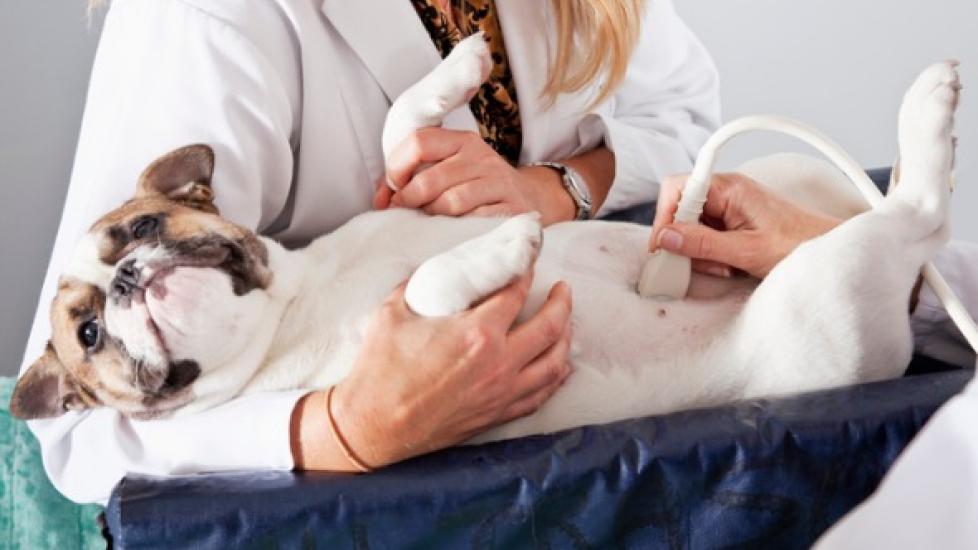Ultrasounds for Dogs and Cats: Everything You Need to Know
Ultrasounds can be very useful in diagnosing health issues in dogs and cats. Here’s what you need to know about ultrasounds for pets.
What Is an Ultrasound?
An ultrasound is a diagnostic tool that uses sound waves to create an image of a body part.
During an ultrasound, the veterinarian uses a computer with a handheld probe. The probe is moved across the surface of the skin over the site of interest.
The sound waves generated by the ultrasound are not harmful or painful to the cat or dog.
What’s the Difference Between Ultrasounds and Radiographs (X-Rays)?
Radiographs are used frequently in daily practice to look inside the body, but they may not be the best option when compared to what an ultrasound image can provide.
With ultrasound, the tissue of an organ can be evaluated instead of just the size or shape, as is the case with radiographs.
Who Is Qualified to Give a Pet an Ultrasound?
Not all veterinarians are trained in ultrasound.
General practice veterinarians can become trained in ultrasonography, and there are also specialists who have undergone board-certified training for ultrasonography. This means that not all veterinary clinics will have the ability to perform an ultrasound.
If an ultrasound is recommended by your regular veterinarian, they may refer you to a specialty practice to have the ultrasound performed. Another option is to have a mobile veterinarian come to the practice to perform the ultrasound exam.
When Would a Dog or Cat Need an Ultrasound?
Here are a few reasons why your pet may need an ultrasound.
Heart Conditions
Your veterinarian may recommend an ultrasound if your dog or cat has a heart condition.
This type of ultrasound is called an echocardiogram, and it helps determine if a pet needs heart medication or not.
This may be done by a board-certified veterinary cardiologist for approximately $500-$600, or an experienced general practitioner for approximately $300-$350.
Abnormal Blood or Urine Test Results
If your veterinarian finds abnormalities in your pet’s blood or urine tests, they may recommend an abdominal ultrasound.
Abdominal ultrasounds allow for the visualization of the internal organs, such as the liver, kidneys, spleen, lymph nodes, urinary bladder, etc., to determine the cause for the abnormalities.
The cost for an abdominal ultrasound is approximately $300-$350 with a general practice veterinarian and $400-$500 with a specialist.
Examination of Other Soft Tissues
An ultrasound can be performed on almost all soft tissues of the body.
Ultrasounds can be used to evaluate:
-
Thyroid glands
-
Fetal viability and development
-
Eyes
-
Ligaments
-
Tendons
If abnormal tissue is found during an ultrasound, the veterinarian may be able to collect samples of the tissue using the ultrasound.
Ultrasound Sample Collection
Common methods for sample collection are:
-
Ultrasound-guided fine needle aspiration
-
Tru-Cut biopsies
These methods of sample collection are typically performed with the cat or dog under sedation. Biopsies collected with ultrasound guidance are less invasive than those collected surgically.
Emergency Ultrasounds
In an emergency setting, valuable information can be gained from focused ultrasound evaluation of the thorax (chest) and abdomen.
Veterinarians can quickly determine if a dog or cat has internal hemorrhage or pneumothorax, for example. This allows for quick development of a treatment plan.
Detection of Foreign Objects
Ultrasound is very useful for looking for gastrointestinal (GI) foreign material that may not be detected on x-rays.
Sometimes objects like cloth, paper, plant material, or thin plastic may not be seen on x-rays but can be found using ultrasound.
Ultrasound can also provide information as to whether a dog or cat with a GI foreign body needs to be immediately taken to surgery or if he/she can be managed medically.
What Should You Do to Prepare Your Pet for an Ultrasound?
You might need to withhold food and water for 8-12 hours, particularly for abdominal ultrasounds.
You do not need to shave your pet’s fur; your veterinarian will shave the area to be examined to obtain better images.
Most pets hold still during the ultrasound; however, some will require sedation by the vet.
What Determines the Cost of the Ultrasound?
Ultrasound costs do not typically vary between cats and dogs. Here are a few factors that influence the cost.
Expertise
The cost is higher when the ultrasound is performed by a specialist versus a general practitioner because the specialist has more in-depth training.
Location
Also, the cost will vary depending on where you live (rural versus urban locations).
Types of Ultrasounds
You will also see cost differences based on how in-depth the ultrasound is. The more complicated the ultrasound, the higher the cost.
Echocardiograms are typically the most involved ultrasounds that require several measurements and calculations, so these ultrasounds tend to cost more. Abdominal ultrasounds require certain measurements as well.
Ultrasounds performed in emergency situations, single-organ ultrasounds (liver only, urinary bladder only, etc.), and pregnancy checks are not as time consuming, so they do not cost as much.
Featured Image: iStock.com/kali9
